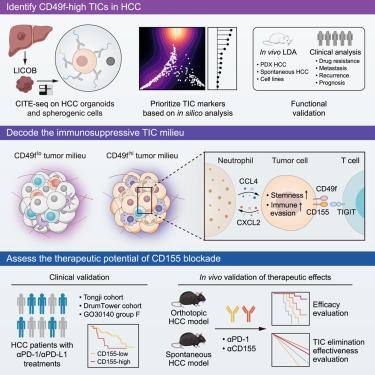针对肿瘤启动细胞的免疫特权,加强癌症免疫疗法
IF 44.5
1区 医学
Q1 CELL BIOLOGY
引用次数: 0
摘要
肿瘤启动细胞(TIC)具有逃避抗肿瘤免疫的能力,这可能是许多癌症免疫疗法失败的原因。在这里,我们发现 CD49f 是辨别肝细胞癌(HCC)中 TIC 的主要标记物,其效果优于其他常用的 TIC 标记物。CD49f高的TIC通过CXCL2-CXCR2轴特异性招募肿瘤促进中性粒细胞,并在肿瘤微环境(TME)中创造免疫抑制环境。反过来,中性粒细胞通过分泌 CCL4 将附近的肿瘤细胞重编程为 TIC 表型。这些细胞可通过 CCL4/STAT3 诱导和 CD49f 稳定的 CD155 表达来逃避 CD8+ T 细胞介导的杀伤。值得注意的是,虽然 CD155 的异常表达有助于免疫抑制,但它也代表了 TIC 特异性的脆弱性。我们证明,在临床前 HCC 模型中,CD155 缺失或抗体阻断都能显著提高对抗 PD-1 疗法的敏感性。我们的研究结果揭示了肿瘤免疫逃避的新机制,并为在 HCC 中将 CD155 阻断与抗 PD-1/PD-L1 治疗相结合提供了理论依据。本文章由计算机程序翻译,如有差异,请以英文原文为准。

Targeting the immune privilege of tumor-initiating cells to enhance cancer immunotherapy
Tumor-initiating cells (TICs) possess the ability to evade anti-tumor immunity, potentially explaining many failures of cancer immunotherapy. Here, we identify CD49f as a prominent marker for discerning TICs in hepatocellular carcinoma (HCC), outperforming other commonly used TIC markers. CD49f-high TICs specifically recruit tumor-promoting neutrophils via the CXCL2-CXCR2 axis and create an immunosuppressive milieu in the tumor microenvironment (TME). Reciprocally, the neutrophils reprogram nearby tumor cells toward a TIC phenotype via secreting CCL4. These cells can evade CD8+ T cell-mediated killing through CCL4/STAT3-induced and CD49f-stabilized CD155 expression. Notably, while aberrant CD155 expression contributes to immune suppression, it also represents a TIC-specific vulnerability. We demonstrate that either CD155 deletion or antibody blockade significantly enhances sensitivity to anti-PD-1 therapy in preclinical HCC models. Our findings reveal a new mechanism of tumor immune evasion and provide a rationale for combining CD155 blockade with anti-PD-1/PD-L1 therapy in HCC.
求助全文
通过发布文献求助,成功后即可免费获取论文全文。
去求助
来源期刊

Cancer Cell
医学-肿瘤学
CiteScore
55.20
自引率
1.20%
发文量
179
审稿时长
4-8 weeks
期刊介绍:
Cancer Cell is a journal that focuses on promoting major advances in cancer research and oncology. The primary criteria for considering manuscripts are as follows:
Major advances: Manuscripts should provide significant advancements in answering important questions related to naturally occurring cancers.
Translational research: The journal welcomes translational research, which involves the application of basic scientific findings to human health and clinical practice.
Clinical investigations: Cancer Cell is interested in publishing clinical investigations that contribute to establishing new paradigms in the treatment, diagnosis, or prevention of cancers.
Insights into cancer biology: The journal values clinical investigations that provide important insights into cancer biology beyond what has been revealed by preclinical studies.
Mechanism-based proof-of-principle studies: Cancer Cell encourages the publication of mechanism-based proof-of-principle clinical studies, which demonstrate the feasibility of a specific therapeutic approach or diagnostic test.
 求助内容:
求助内容: 应助结果提醒方式:
应助结果提醒方式:


